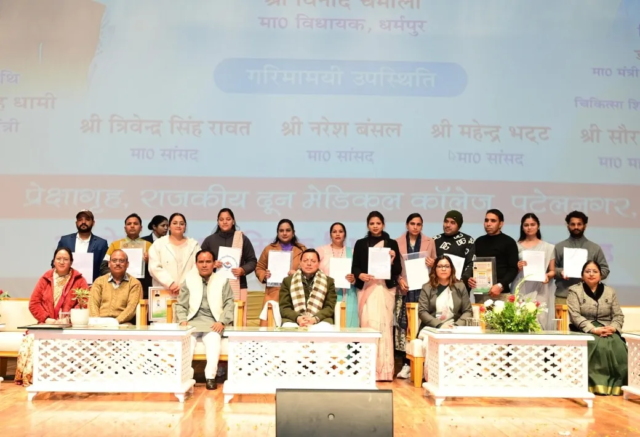Uttarakhand: Government is making both policy and institutional efforts to connect people of the hilly region with self-employment – Ganesh Joshi

b
Agriculture and Horticulture Minister Ganesh Joshi said that the production of Barhanaja millets has been the fundamental identity of Uttarakhand. In view of this, the government has brought Uttarakhand Millets Policy 2025 – 26 to produce millets like Mandua, Kauni, Jhangora again in modern and scientific ways. Which will be applicable in 11 hill districts.
The minister said that in the same way, to develop the mountainous region of Uttarakhand as a fruit belt, farmers are being motivated by the government to expand the production of modern fruits like kiwi and dragon fruits and apple production. Due to this, the government has brought Uttarakhand Kiwi Policy, Dragon Fruits Farming Scheme, Chief Minister Micro Food Enterprise Upgradation Scheme and Apple Post-Harvest Management Scheme. He said that with these efforts, people in the hills will get self-employment at the local level, which will also prove to be directly and indirectly helpful in preventing problems like migration.
Uttarakhand State Millets Policy 2025-26
- Under this policy, work will be done in two phases.
- In the first phase, work will be done on 30000 hectares of area in 24 development blocks from 2025-26 to 2027-28.
- In the second phase, work will be done on 40000 hectares of area in 44 development blocks from 2028-29 to 2030-31.
- Millet policy will be implemented in 11 districts of the state.
- Under the Uttarakhand State Millets Policy, a total action plan of Rs 134.89 crore will be operated.
- Mandua, Jhangora, Ramdana, Kauni and Cheena crops have been included in this.
- Under which the seeds and bio-fertilizers of selected millet crops will be distributed to the farmers at 80 percent subsidy.
- Farmers will be given incentives for sowing millets.
- An incentive of Rs. 4000 per hectare will be given for row sowing and Rs. 2000 per hectare for direct sowing.
- Incentives will be paid to the group at the rate of Rs. 300 per quintal instead of Rs. 150 per quintal on the adoption of millets crops.
- Every year, under the Millets Policy, 02 farmer groups will be awarded for excellent work at the development block level.
- 01 millet processing unit will be established at each development block level.
- A project management unit of Nutri Hub will be formed in the state for the promotion and promotion of millets crops.
- Provision for third party audit has also been made in this.
- The target is to benefit more than 3 lakh farmers under the scheme.
- Work will also be done for the establishment of Shrianna Food Park.
Uttarakhand Kiwi Policy
- The proposed policy will be from the year 2025-26 to 2030-31 (6 years).
- A provision of 70 percent state subsidy of the total cost of Rs 12 lakh per acre has been made for setting up a kiwi garden. In which 30 percent will be the share of the beneficiary.
- This policy will be implemented in the remaining 11 districts of the state except Haridwar and Udham Singh Nagar.
- Under the Kiwi Policy, a total work plan of Rs 894 crore will be operated. The minimum land eligibility will be 02 Nali (0.04 hectare) and the maximum land eligibility will be 100 Nali (2 hectare).
- Under the Kiwi Policy, the target is to cover 3500 hectares of area, in which about 17500 farmers will be benefited.
- At present, 382 metric tonnes of kiwi is being produced in an area of about 683 hectares of the state. The target is proposed to increase the current production to 33000 metric tons and productivity to about 08 metric tons per hectare.
Dragon Fruit Farming Scheme
- The proposed scheme will be from the year 2025-26 to 2027-28 (3 years).
- This scheme will be applicable in 07 districts of the state (Udham Singh Nagar, Haridwar, Nainital, Bageshwar, Pauri, Dehradun, Tehri).
- It has been approved under the Chief Minister State Agriculture Development Scheme to promote the production of dragon fruit in the state through modern / scientific method.
- The proposed scheme provides 80 percent subsidy of Rs 08 lakh per acre for garden establishment and the remaining 20 percent will be borne by the farmer.
- The minimum land eligibility will be 05 Nali (0.10 ha) and the maximum land eligibility will be 20 Nali (0.40 ha).
- An amount of Rs 15 crore has been proposed for the scheme in the next three years.
- At present, 70 MT dragon fruit is being produced in about 35 acres of area in the state.
- In view of the current scenario and the immense possibilities of dragon fruit production in the state, districts Udham Singh Nagar, Nainital, Bageshwar, Haridwar, Dehradun, Pauri and Tehri have been selected in the proposed scheme.
- It is proposed to cover 228 acres of area from the financial year 2025-26 to 2027-28, which will have a productivity of 12 to 15 metric tonnes per hectare.
- About 450 farmers of the state will be benefited in this.
- Chief Minister Micro Food Enterprise Upgradation Scheme (CMFME)
- Under the Prime Minister Micro Food Enterprise Upgradation Scheme (PMFME) by the State of Uttarakhand, an additional 25% or maximum Rs. 5 lakh top-up is being given under the Chief Minister Micro Food Enterprise Upgradation Scheme (CMFME) to the food processing units established in the hilly areas after 22.09.2022.
- Earlier, sorting / grading units were not included under this scheme.
Under the Pradhan Mantri Micro Food Enterprise Upgradation Scheme (PMFME) scheme, the sorting / grading units established in the hilly areas of the state after 22.09.2022 (all areas of Uttarkashi, Chamoli, Rudraprayag, Tehri, Pauri, Pithoragarh, Champawat, Bageshwar, Almora, Nainital hilly area (all areas except Haldwani and Ramnagar), Dehradun hilly area (all areas except Sahaspur, Raipur, Doiwala and Vikasnagar) will also be given additional 25% or maximum Rs 5.00 lakh top-up under the Chief Minister Micro Food Enterprise Upgradation Scheme (CMFME).
- After the approval of this scheme, a total of 780 units will get the benefit.
- The establishment of these units will increase employment in the hilly area and stop migration.
Post-harvest management scheme for apple in the state
- Under this scheme, the scheme will be implemented for 07 years (year 2024-25 There is a provision of Rs 129.97 crore in the scheme (2031-32), in which the target is to establish 22 CA storage and 180 sorting grading units.
- This scheme will be operated in 76 development blocks of 11 districts.
- Under this scheme, 15% top-up is to be given in the individual sector and 35% for FPO etc. for the establishment of sorting grading unit.
- In the year 2026-27, there will be 50% subsidy for the individual sector and 70% for FPO etc.
- For Control Atmosphere Cold Storage (CA Storage), a total subsidy of 50% i.e. maximum Rs 4 crore is to be provided for individual sectors, registered firms, partnership firms.
- 70% subsidy i.e. Rs 5.70 crore is to be given for FPOS, SHGS, etc.
- For CA storage, there should be own land or 30 years lease.
- For sorting grading unit, there should be own land or 15 years lease.
- Under the scheme, the target is to establish 22 CA storage and 180 sorting grading units.
- Sorting grading unit will be established in 1000 metric ton apple producing area.
- CA storage unit will be established in 5000 metric ton apple producing area.
- In the next 07 years, 5000 hectare area will be covered under apple’s ultra intensive horticulture scheme, which will have a productivity of 25 metric ton per hectare.







